First transgender soldiers seek formal Army recognition
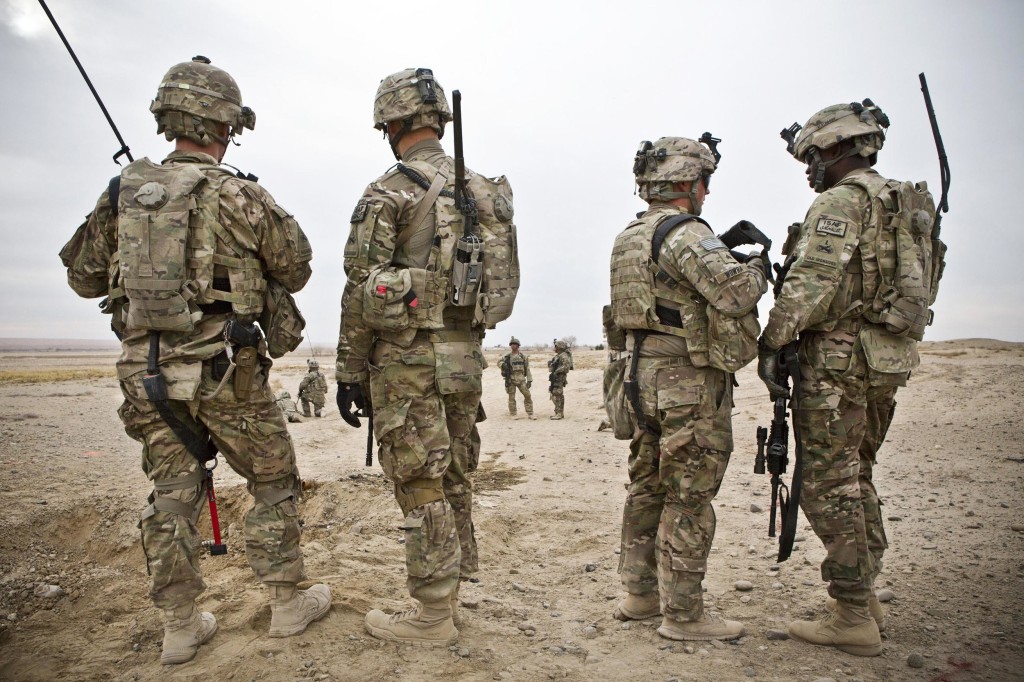
Within weeks of the Pentagon allowing transgender service members to serve openly, Army officials said 10 soldiers have formally asked to be recognized as their new, preferred gender. The small number represents only those who have publicly said they are transgender, and doesn’t include soldiers who may be considering or beginning gender transition or those who don’t yet want to make an official paperwork change. Gen. Mark Milley, chief of staff of the Army, said the key now is to educate the force, particularly commanders who will have to make decisions about soldiers in their units who request a gender change. “Is the army ready? Well, we are educating ourselves, and we are trying to get ready,” Milley said in an interview with The Associated Press. “We’re well-past the issue of debating and arguing about transgender. We are now into execution, to make sure the program is carried out with diligence, dignity, respect.” The Pentagon policy took effect Oct. 1, and Army Secretary Eric Fanning approved the service’s new transgender guidelines earlier this month. Defense Secretary Ash Carter announced in June that he was ending the ban on transgender individuals serving openly in the military. Transgender troops are now able to receive medical care and begin changing their gender identifications in the Pentagon’s personnel system. Next year, the military services will begin allowing transgender individuals to enlist, as long as they meet required standards and have been stable in their identified gender for 18 months. “We’re monitoring implementation closely, and everything we’ve seen so far points to a military organization fully committed to treating everyone equally and providing medically necessary care to all troops, not just some,” said Aaron Belkin, director of the California-based Palm Center, an independent research institute. “My conclusion, so far, is that implementation has proceeded smoothly and successfully.” Milley and other military leaders expressed concerns that the department was moving too fast. “The issue to do it or not to do it, to me is not an issue – the answer is yes,” Milley said. “The question of how to do it so that it is deliberate, well thought out, executed with professionalism – that’s a horse of a different color. Frankly I asked for more time.” Milley said he did a lot of “self-education,” meeting with transgender individuals, both military and civilian, as well as other groups. Now, he said, the Army is getting education programs out to the force to make sure troops and commanders know the new rules, process, medical criteria and who has the authority to make decisions on a service member’s gender change. Under the new Army guidelines, training must be developed by Nov. 1, and it must be completed throughout the force by next July. “It’s going to take a little bit of time, but there are some things I don’t think you need to necessarily be trained on,” Milley said. “Rule One is treat your soldiers, your subordinates, your peers and your superiors as you want to be treated. Treat everybody with dignity and respect. Period. Flat out. Full stop.” Transgender troops currently serving can request that their gender be officially changed, and they can submit required documentation, including medical approval saying the person has been stable in his or her preferred gender for 18 months and a driver’s license showing the preferred gender. Commanders will have 30 days to respond for active duty troops and 60 days for soldiers in the National Guard and Reserve. The transgender service members will be able to use the bathrooms, housing, uniforms and fitness standards of their preferred gender only after they have legally transitioned to that identity and it’s documented in their military personnel records. The new policy, however, gives military commanders some flexibility, noting that not all gender transition cases are the same. Commanders will have the discretion to make decisions on a case-by-case basis, including on job placement, deployments, training delays and other accommodations, based on the needs of the military mission and whether the service members can perform their duties. According to the Army guidelines, commanders can allow “reasonable accommodations” including changes to housing, bathroom and shower use to respect the modesty or privacy interests of soldiers and maintain moral, order and discipline. But, it prohibits creating transgender-only areas and says that any privacy accommodations that are made must be open for use by all soldiers, not just transgender individuals. And commanders can’t force a soldier to use a bathroom or shower of the person’s preferred gender before their legal transition. According to Carter, a RAND study found that there are between 2,500 and 7,000 transgender service members in the active duty military, and another 1,500 to 4,000 in the reserves. Milley said the Army numbers so far are low, but the service doesn’t track the number of soldiers who may be starting the gender transition process. “We may not know the full scope yet,” said Milley. “Others that may consider themselves as transgender but haven’t self-identified publicly may be holding back because they want to see how things progress.” Republished with permission of the Associated Press.
Investigation report faults top Pentagon aide’s behavior

A Pentagon investigation has concluded that Defense Secretary Ash Carter‘s former senior military aide used his government credit card at strip clubs or gentlemen’s clubs in Rome and Seoul, drank in excess and had “improper interactions” with women, The Associated Press has learned. The aide, Maj. Gen. Ron Lewis, who was fired nearly a year ago by Carter, submitted a written rebuttal slamming the investigation. Lewis asserted that the Defense Department’s inspector general had amassed an inaccurate and inflammatory case based on innuendo and had failed to “find the truth.” The inspector general’s report says Lewis improperly used his credit card, lied to a bank to get charges removed and said he was guilty of conduct unbecoming an officer, a violation of the code of military justice, according to people familiar with the report. They spoke on condition of anonymity because they weren’t authorized to discuss the report before its release. In the rebuttal, obtained by the AP, Lewis denied that the bar he went to in Rome was a strip club and denied that he went to a strip or gentleman’s club in Seoul, South Korea, in an area of the city that the report calls “Hooker Hill.” Kathie Scarrah, the inspector general’s spokeswoman, confirmed that Lewis was investigated for allegations that he “misused his government travel charge card for personal expenses; made false official statements regarding his government travel card misuse; and engaged in other inappropriate behavior.” She provided no other details, but said the inspector general substantiated the allegations and recommended the Army “take appropriate action.” The full report has not yet been made public. It was expected to be released Thursday. Carter issued a statement saying he was briefed on the investigation but would defer comment pending an Army review. More broadly, he said, “I expect the highest possible standards of conduct from the men and women in this department particularly from those serving in the most senior positions. There is no exception.” The report will go to Army leaders who will determine what, if any, punishment is required and at what rank Lewis would be able to retire “The Army takes allegations of misconduct seriously and demands all senior leaders, regardless of rank, uphold the highest standards of moral character and competence,” said Army spokesman Col. Pat Seiber. Lewis took responsibility for several inappropriate actions, including charging nearly $1,800 on his government credit card at what he called a “dance club” in Rome. In an embarrassing set of circumstances, Lewis said he tried to use his personal debit card at the club, but it didn’t work, so he had to walk back to his hotel with a female employee of the club, and wake up a Defense Department staff member to get his government card to pay the bill. He said he paid back the charges when he returned to the U.S. The report identified the club as Cica Cica Boom, but Lewis said that’s not the club he went to. He said he went to a “high-end establishment with a respectable clientele that had a DJ, a bar area and a dance floor where couples were dancing.” A photo of Cica Cica Boom shows a sign above the doorway that also advertises lap dances there. Lewis had shot up the promotional ladder, and his job with Carter stemmed from their close professional relationship. He had served as an aide for Carter when Carter was deputy defense secretary. In Korea, the report said, Lewis went to a gentleman’s club called the Candy Bar. Lewis denied going there as well, but acknowledged being in a commercial area of Seoul. He said that when he returned to Washington and saw two charges on his credit card totally about $1,100, he called the bank to have them removed and the bank agreed. Investigators presented him with two receipts from the club bearing the name “Candy.” Both receipts show only a short pen mark in the signature area, and do not show his written name. The report says investigators, after getting Lewis’ rebuttal, went back and checked their information, and said they stand by their findings. The report portrays a senior officer who often went out alone on overseas trips, and who sometimes drank in excess. The report also describes a night in Hawaii last November – just days before Lewis was fired – when he went to dinner and later went back to his room with an enlisted service member. The report says she told investigators that Lewis approached her and appeared to want to kiss her, but she stopped him and left. Lewis said another staff member was in the hotel room for much of the time, and that even when he was alone with the enlisted service member “our discussions remained the type of conversation a command team would engage in.” He said he has known the unidentified service member for several years. The report also describes Lewis sharing a cigar with a female Defense Department staff member during drinks in Malaysia with a large number of other staff and journalists. It says others there said they were uncomfortable with Lewis’ actions and said he was sitting too close to the staff member. The report does not suggest that Lewis had an extramarital affair or that he had sex with any of the women. And Lewis, in his rebuttal, criticizes the report for relying on insinuations and statements from people who may have distorted the facts or didn’t actually see what happened. Officials with knowledge of the matter said the allegations of misconduct, which first surfaced after the November overseas trip with Carter, stunned the secretary and sent shockwaves through the Pentagon. Republished with permission of the Associated Press.
CAE USA to open key Army aviation training center in Alabama

A Tampa-based aviation training company plans to begin offering flight training to U.S. Army aviators at a training facility opening in Dothan. CAE USA plans to open the facility in 2017 as part of the company’s $75 million investment in the state, a little more than 20 miles from Fort Rucker and the U.S. Army’s Aviation Center of Excellence, the headquarters of Army Aviation and primary location for Army helicopter flight training for more than five decades. “Alabama has more 100 years in aerospace history, and I am proud to see CAE make progress on the construction of the new Dothan Training Center located at the Dothan Regional Airport,” Governor Robert Bentley said Thursday morning. “This world-class training facility will train Army and Air Force pilots to keep our nation safe.” With the project progressing, the company has taken delivery of the first aircraft that will be used in the U.S. Army Fixed-Wing Flight Training program at the Alabama center. CAE has also begun preparing its initial cadre of instructor pilots for the program. “Our new Dothan Training Center will provide the Army with a modern, flexible and cost-effective training solution specifically designed for the Army’s fixed-wing aviators,” said Ray Duquette, president and general manager of CAE USA. “The state of Alabama, Department of Commerce and all the local government organizations in the Wiregrass area have been incredibly supportive and instrumental in the creation of what will be a truly world-class training facility,” he added. Beginning next spring, the company’s new 79,000-square-foot center will provide comprehensive training for more than 450 U.S. Army fixed-wing aviators each year, as well as Air Force crews flying C-12 twin turboprop aircraft. “We are extremely excited to see a world-wide leader in aviation training locate in the Wiregrass region,” Dothan Mayor Mike Schmitz said. “Through the team led by Governor Robert Bentley including our local, state, and federal officials and partners, this project was made possible to bring new technology, innovation, and high-paying jobs to the area.”
Pentagon officials draw sharp questions from GOP on Syria
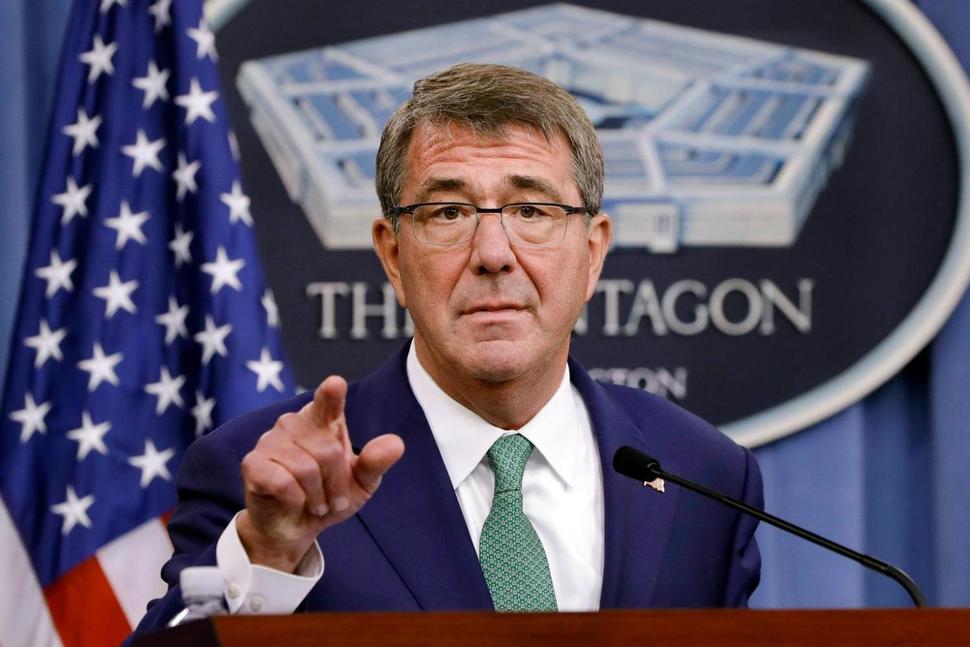
The nation’s top military officials faced sharp questions on Thursday from Republicans angry that the Obama administration is not taking more aggressive steps to end the 5-year-old-civil war in Syria. A senior GOP senator dismissed Secretary of State John Kerry as “intrepid but delusional” for trying to work with Russia. Defense Secretary Ash Carter and Gen. Joseph Dunford, the chairman of the Joint Chiefs of Staff, testified before the GOP-led Senate Armed Services Committee after the latest attempt to secure a cease-fire in Syria all but collapsed. Republicans are skeptical, even hostile, to the idea that Russia is a willing partner for peace and would work with the United States to combat Islamic State militants and al-Qaida. Sen. John McCain, R-Ariz., the committee’s chairman, opened the hearing by saying that the administration “still has no plausible vision of an end-state for Syria.” Instead, McCain said that while Russian and Syrian aircraft “bombed hospitals, markets, aid warehouses, and other civilian targets, President Obama sent his intrepid but delusional secretary of state to tilt yet again at the windmill of cooperating with” Russian President Vladimir Putin. Sen. Lindsey Graham, R-S.C., a defense hawk and one of President Barack Obama‘s most vocal critics, said he anticipated the hearing will be contentious because of mounting frustration among lawmakers over a lack of a coherent strategy for ending the conflict. “I expect this to be confrontational,” Graham said. “At the end of the day, I think Congress needs to challenge what’s going on in Syria.” The failure to establish a no-fly zone in the country’s north to protect Syrians from the bombing has been a mistake, according to Graham, and he also criticized the reliance on Kurdish fighters the U.S. has been supporting in the fight against the Islamic State. Although the battle-hardened Kurds have proven to be effective, their success has alarmed Turkey, which is grappling with a Kurdish insurgency in its southeast. Although Turkey has repeatedly called for a no-fly zone, the Obama administration has resisted, unwilling to wade too deeply into an intractable conflict. Tensions between Russia and the United States have only heightened in recent days after authorities in Washington determined with a very high degree of confidence that an attack on a humanitarian aid convoy in Syria earlier this week was carried out by a Russian-piloted aircraft. The assessment laid more deliberate blame on Moscow for the strike on the Syrian Arab Red Crescent convoy, which killed 20 civilians. Washington had said Tuesday that Russia was to blame, but that the strike delivered by a Russian-made Su-24 could have been carried out by Russia or Syria. Both militaries use Su-24 fighter jets. But officials said Wednesday the U.S. has gathered enough intelligence to say that it was Russia, not Syria, that launched the airstrike. Kerry called for all warplanes to halt flights over aid routes and at a U.N. Security Council session he raised “profound doubt” about the willingness of Russia and Syria to abide by the cease-fire. The Sept. 9 truce envisioned a U.S.-Russian military partnership against the Islamic State and al-Qaida if violence was reduced and aid delivered over the course of seven continuous days. The Pentagon, however, voiced reservations about coordinating air strikes and sharing intelligence with Russia. McCain assailed the potential partnership, saying it would “mean that the U.S. military would effectively own future Russian airstrikes in the eyes of the world.” Republished with permission of the Associated Press.
Martha Roby applauds U.S. House passage of VA reform legislation

A bill that would create greater accountability measures on Department of Veterans Affairs workers and enhance protection for whistleblowers who expose wrongdoing passed the U.S. House of Representatives on Wednesday. The H.R. 5620: VA Accountability First and Appeals Modernization Act, would allow the VA secretary more flexibility to fire, demote or otherwise punish mid-to-lower level employees for misconduct or poor performance, according to a release sent out by the bill’s co-sponsor Alabama 2nd District U.S. Rep. Martha Roby. According to Roby, the current accountability measures only apply to senior managers and not rank-and-file employees. Roby said the legislation will make a difference in improving care for veterans. “The Central Alabama VA was home to some of the worst abuses nationwide,” explained Roby in a release. “Because of the corruption and misconduct we exposed, the director became the first senior manager fired for cause under the new VA accountability law. That was certainly needed, but it didn’t go far enough.” “I’ve said all along that the blame for what happened does not rest with one person alone. There has been a culture of complacency at the VA throughout the ranks because mid-to-lower level employees know they can almost never be fired. This reform bill changes that by finally giving the VA Secretary the authority to swiftly fire, demote or otherwise punish employees for poor performance or misconduct.” Working with whistleblowers and the press, Roby helped expose major instances of malfeasance and mismanagement that resulted in the Central Alabama VA director being the first senior manager in the country fired under the reform law enacted in 2014. However, that law only allowed the Secretary to deal with senior leaders, not mid-to-lower level employees. Wednesday’s bill would expand those measures down the ranks to ensure all employees can be held accountable for misconduct or poor performance in the treatment of veterans. Roby also lauded the whistleblower protections contained in the bill, calling the treatment of her sources “a disgrace.” “The bill also enhances protections for whistleblowers, and I cannot emphasize enough how important that is. If it weren’t for the brave whistleblowers who told me the truth, who knows if we’d have ever gotten to the bottom of the problems in Central Alabama,” said Roby. “And, the way they were treated was a disgrace. There need to be real consequences for intimidating or retaliating against whistleblowers, and this bill delivers just that.” In summary, H.R. 5620 does the following: Authorizes the Secretary of Veterans Affairs to fire, or demote any VA employee for performance or misconduct. Employees would be afforded due process, including an expedited appeal to the Merit Systems Protections Board; Authorizes the Secretary to reduce a senior manager’s pension if they are convicted of a felony related to their job. Enhances protections for whistleblowers by providing additional reporting mechanisms and mandating that any supervisor found to have retaliated against a whistleblower be suspended or terminated, with the possibility of bonus recoupment. Improves the VA’s appeals process by giving veterans more options and better clarity for pursuing an appeal.
Donald Trump: US generals ‘reduced to rubble,’ he’d replace some
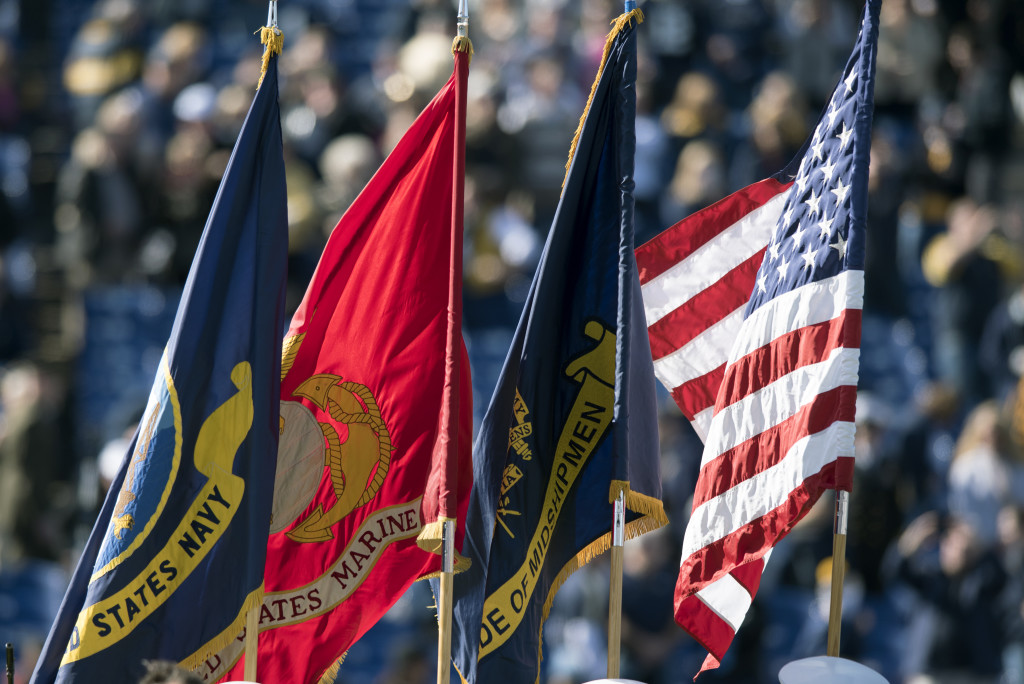
Leveling unusually harsh criticism against the military, Republican Donald Trump said Wednesday night that America’s generals have been “reduced to rubble” under President Barack Obama and suggested he would fire some of them if he wins the presidency in November. Trump’s comments came during a televised national security forum where he and Democratic rival Hillary Clinton each fielded 30 minutes of questions about their experience and judgment to be commander in chief. While the candidates never appeared on stage together, their back-to-back sessions served as a preview of sorts for their upcoming debates. By virtue of a coin flip, Clinton took the stage first and quickly found herself responding at length to questions about her years in government. She reiterated that she had made mistakes in relying on a personal email account and private server as secretary of state and in voting for the 2003 invasion of Iraq as a senator. But she defended her support for U.S. military intervention to help oust a dictator in Libya, despite the chaotic aftermath. “I’m asking to be judged on the totality of my record,” said Clinton, who grew visibly irritated at times with the repeated focus on her past actions. Clinton, who has cast Trump as dangerously ill-prepared to be commander in chief, tried to center the discussion on her foreign policy proposals should she win in November. She vowed to not send American ground troops into Iraq or Syria to fight the Islamic State group. And she pledged to hold weekly Oval Office meetings with representatives from the Pentagon and Department of Veterans Affairs to stay abreast of health care for veterans. Trump did little to counter the criticism that he lacks detailed policy proposals, particularly regarding the Islamic State. He both insisted he has a private blueprint for defeating the extremist group and that he would demand a plan from military leaders within 30 days of taking office. Asked to square his request for military options with his harsh criticism of the current crop of generals, Trump said simply: “They’ll probably be different generals.” Trump renewed his praise of Russian President Vladimir Putin for having “great control over his country.” He stood by a previous comment that appeared to blame military sexual assaults on men and women serving together, but added he would not seek to remove women from the military. And for the first time, he opened the door to granting legal status to people living in the U.S. illegally who join the military. “I think that when you serve in the armed forces, that’s a very special situation,” Trump said. “And I could see myself working that out.” As a businessman with no substantial national security experience, Trump was vague about how he is preparing for the enormous array of complex issues that would land on his desk as commander in chief. He cited his team of military advisers, but also said he has “a common sense” that will help him make decisions on foreign policy. With just two months until Election Day, national security has emerged as a centerpiece issue in the White House race. Both candidates believe they have the upper hand, with Clinton contrasting her experience with Trump’s unpredictability and the Republican arguing that Americans worried about their safety will be left with more of the same if they elect Obama’s former secretary of state. While GOP candidates are often seen by voters as having an advantage on military and national security issues, Trump is far from a traditional Republican. He has no military experience and has repeatedly criticized the skill of the armed forces. A flood of Republican national security experts have instead chosen to back Clinton, helping bolster her case that Trump is broadly unacceptable. Earlier Wednesday, former Defense Secretary William Cohen joined the list of GOP officials supporting Clinton. Ahead of the forum, Trump rolled out a new plan to boost military spending by tens of billions of dollars, including major increases in the number of active troops, fighter planes, ships and submarines. His address earlier in the day also included plans to eliminate deep spending cuts known as the “sequester” that were enacted when Congress failed to reach a budget compromise in 2011. Republicans and Democrats voted for the automatic, across-the board cuts that affected both military and domestic programs, though the White House has long pressed Congress to lift the spending limits. Trump expressed support for the sequester in interviews in 2013 – even describing them as too small – but seemed to suggest at the time that military spending should be exempt. A senior adviser said ahead of the speech that Trump would make sure the additional spending was fully paid for but did not explain how. The United States currently spends more than $600 billion a year on the military, more than the next seven countries combined. Republished with permission of the Associated Press.
Donald Trump promises huge boost in military spending

Republican Donald Trump vowed Wednesday to boost defense spending and deploy more active troops, fighter planes, Navy ships and submarines as he works to convince skeptics in both parties that he’s ready to lead the world’s most powerful military. The New York businessman, who has struggled at times to demonstrate a command of foreign policy, also seemed to acknowledge he does not currently have a plan to address cyber security or the Islamic State group. If elected, Trump said he would give military leaders 30 days to formulate a plan to defeat the group, commonly known as ISIS. He also said he would ask the joint chiefs of staff to conduct a review of the nation’s cyber defenses to determine all vulnerabilities. Trump’s address came hours before his national security acumen is tested at a “commander in chief” forum on NBC. “We want to deter, avoid and prevent conflict through our unquestioned military strength,” Trump declared of his Democratic opponent in his Wednesday speech, delivered inside the exclusive Union League of Philadelphia, which first allowed women in 1986. The appearances mark an intense, two-day focus on national security by Trump, who has offered tough rhetoric – but few details – on America’s challenges abroad. Trump’s rival, Democrat Hillary Clinton, has tried to paint the billionaire businessman as erratic, making the case that his disposition would be a major liability on the world stage. “They know they can count on me to be the kind of commander in chief who will protect our country and our troops, and they know they cannot count on Donald Trump,” Clinton said Tuesday. “They view him as a danger and a risk.” Trump’s team has worked aggressively in recent days to turn deflect such criticism back at Clinton. “She’s trigger-happy and very unstable,” Trump said of his Democratic opponent, calling her use of a private email server while secretary of state “reckless.” While Clinton and Trump will be featured at the Wednesday night forum, they will appear at separate times and will not face each other on stage. The forum could serve as a warm-up to their highly anticipated first presidential debate, scheduled for Sept. 26 in New York. Trump’s Union League address also included his plans to eliminate deep spending cuts, known as the “sequester,” enacted when Congress failed to reach a budget compromise in 2011. Republicans and Democrats voted for the automatic, across-the board cuts that affected both military and domestic programs. Military leaders have said that they can live with an active duty Army of 490,000 – bolstered by nearly 500,000 soldiers in the National Guard and Reserves – as long as Congress provides enough funding to support that troop level. Gen. Mark Milley, the Army chief of staff, said last month that he is comfortable with a 1 million-soldier Army, and would welcome a larger force, only if Congress provides the money to maintain troop readiness. Increasing the size without increase other support, he said, will decrease readiness and hollow out the force. As for how he would pay for it, Trump insisted on Wednesday that he would fully offset the costs of his new spending through savings and new revenue. He said he would make the government “leaner,” in part by using attrition to shrink the workforce, and said he’d bring in new money by asking countries like Germany, Japan and Saudi Arabia to pay more for the security the U.S. provides them. Even before promising a huge boost in military spending, Trump’s plans to cut taxes, expand infrastructure spending and leave untouched entitlement programs such as Social Security already threatened to add trillions of dollars to the federal deficit. Trying to emphasize his military support, Trump’s campaign released a letter on Tuesday from 88 retired generals and admirals citing an urgent need for a “course correction” in America’s national security policy. It was aimed at rebutting Clinton’s arguments that she would be best positioned to lead the military and reassuring Republicans who have openly worried that his provocative statements might undermine U.S. alliances. Trump’s proposal to lift the sequester limits on military spending won praise from Republicans on Capitol Hill even as some acknowledged the reality that Democratic opposition might render it difficult to achieve. “Obviously it’s not something that would get through this Congress, so that’s something we’d have to look at the election next year. But I agree with him in terms of lifting the sequester on defense, he’s absolutely correct about that,” said GOP. Rep Tom Cole of Oklahoma, a high-level member of the Appropriations Committee. But questions remain, even in his party. Bob Corker, the Republican chairman of the Senate Foreign Relations Committee, repeatedly refused to say directly whether he had confidence in Trump as commander in chief when questioned on MSNBC’s “Morning Joe” on Wednesday. “I do believe that Donald Trump is growing in his understanding of these issues and I think that he’s beginning to get more and more people around him that have a depth of understanding as to the complexities and I’m watching this evolve,” he said. Republished with permission of the Associated Press.
Memo confirms Pentagon playing politics with military, Bradley Byrne says

An internal Pentagon memo surfaced Tuesday detailing a political strategy for the Secretary of Defense and other defense officials to play “hardball” against House Republicans on the annual defense budget. First reported by POLITICO, the memo details the Pentagon’s plan to play lawmakers against one another in order to defeat the House-passed National Defense Authorization Act (NDAA) — a controversial effort to boost military spending by $18 billion, which could provide the largest troop pay raise in years and reverse an Army drawdown. President Barack Obama has threatened to veto the bill. “In short, we should attack the … gimmick and be prepared to play hardball opposing it,” according to the memo co-written by DOD Comptroller Mike McCord and Stephen Hedger, assistant secretary of defense for legislative affairs. “The veto threat is our primary weapon. However, a veto threat only works if it is supported by the Democratic leadership and their caucuses. Our job is to encourage and support those efforts.” Alabama 1st District U.S. Congressman Bradley Byrne, a member of the House Armed Services Committee, says the memo confirms the Pentagon is playing politics with the U.S. military. “The Obama Administration has a track record of using our military men and women as pawns in their political game, but this memo makes clear they have no shame in doing so,” said Byrne in a news release. “There is no greater responsibility of the Congress than to provide for the common defense, and we cannot allow these kind of petty politics to stand in our way.” The memo, dated May 13, surfaced as House and Senate members returned to Washington for the first time since July after a long summer recess, where military budget negotiations will soon resume. The U.S. House of Representatives passed the NDAA in May on a bipartisan vote of 277 to 147.
Bradley Byrne: Working for you
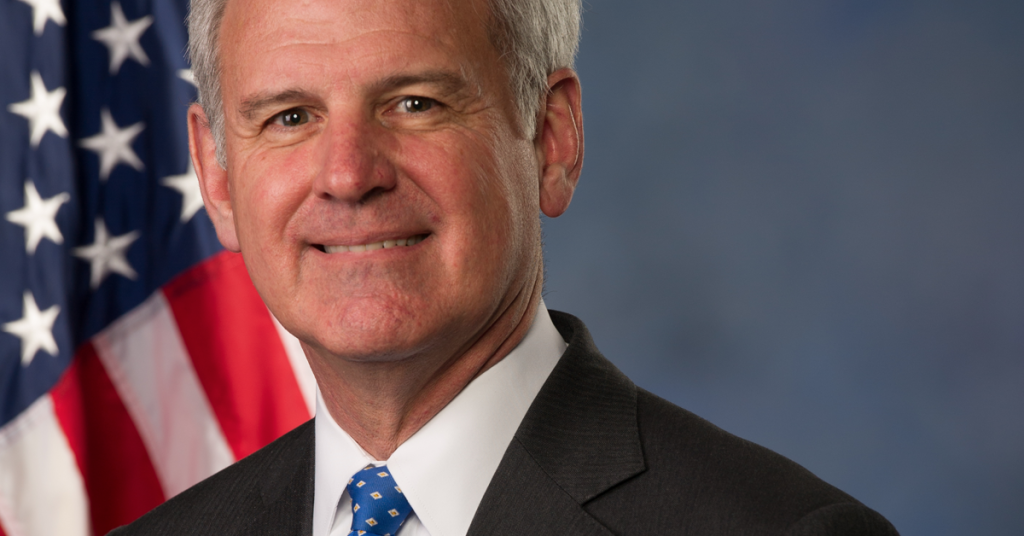
When most people think about the job of a member of Congress, they often think about casting votes or attending committee meetings. While these are important parts of the job, much of my time is spent providing important services to the people of Southwest Alabama. One of the key roles of my Congressional office is known as casework. This means helping residents of Alabama’s First Congressional District navigate the federal bureaucracy. We can do this by intervening on your behalf to check on the status of issues with agencies like Social Security or Medicare. The overwhelming majority of the cases my office works on are related to the Department of Veterans Affairs (VA). This is due to both the unusually high number of veterans in Southwest Alabama and the incompetent management of the VA on the benefits and health care sides of the department. If you are having issues with the VA or any other federal agency, please contact my office so we can check on the issue for you. My staff and I cannot promise perfect outcomes, but we will do everything we can to ensure you are treated fairly and that your case receives the attention it deserves. If your business or organization is having an issue with other federal agencies, my staff may be able to assist with that as well. The same goes for any issues you may be experiencing with obtaining a passport for international travel. It is important to remember that my office can only assist with federal agencies or programs. We do not have the ability to intervene on local or state issues. Additionally, my office does not get involved in legal matters. If you have questions about these issues, my staff and I are happy to try and point you in the right direction. Another service my office provides is nominating young men and women from Southwest Alabama to serve in one of our nation’s military service academies. In order to attend most of our service academies, students must be nominated by a U.S. Congressman or Senator. Each year, I hold a Service Academy Night to allow young people to learn more about the process and visit with representatives from each of the academies. This year’s Academy Night is Oct. 3 at St. Paul’s Episcopal School in Mobile. The honor of attending a service academy comes with an obligation to serve for a minimum of five years upon graduation. My office also can help arrange for you to receive a flag that has flown over the United States Capitol. Many people have found these flags to be the perfect gift to recognize a friend or loved one upon their retirement, graduation, birthday, or other occasion. Some families also request a flag for the funeral of a deceased veteran, and we are honored to expedite such requests. If you are planning a visit to Washington, D.C., my staff can also help arrange for tours of some of our national landmarks like the U.S. Capitol, the Library of Congress, or the Supreme Court. We can also assist with tours of the White House, but those requests should be made at least six weeks in advance. These are just a few of the services my office provides that you may not have been aware of. Of course, my staff and I are always available to answer questions about federal legislation or other issues under debate in Congress. • • • Bradley Byrne is a member of U.S. Congress representing Alabama’s 1st Congressional District.
Robert Bentley announces new website to help Alabama veterans
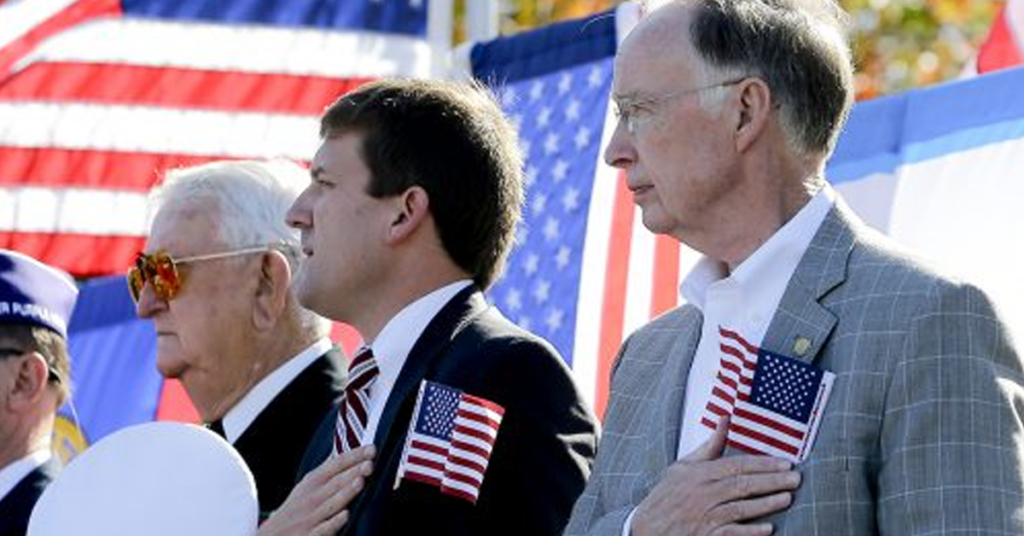
Gov. Robert Bentley announced a new online tool Tuesday for Alabama’s veterans and their families. The Alabama Executive Veterans Network (AlaVetNet) is comprehensive website that will serve as a hub for resources, providing a mechanism for veterans to find the services they need in a much faster and more user-friendly manner. “Alabama is a proud pro-military state, and we appreciate the sacrifice of our brave servicemen and women, and we owe it to them to ensure they are receiving the help they need in a timely manner,” said Bentley. “Eight percent of Alabamians serve in the military and the new AlaVetNet website will provide a one-stop-shop to assist veterans and their families in locating the variety of services available.” Bentley established AlaVetNet through Executive Order 42 in December 2013, which brought nonprofits, state agencies and businesses together in a central forum to collaborate and develop cohesive policies that best serve Alabama veterans. The goal of AlaVetNet is to use the existing resources and explore opportunities to expand the services. The committee developed a long-range plan for a unified, statewide system for the delivery of services aimed at helping those who served in the military. The AlaVetNet website is organized into six service areas: education, employment, homelessness, family services, legal, and behavioral health. Each committee is led by a chair and two co-chairs representing state agencies or well-established nonprofits. “I am really proud of the AlaVetNet team, and I am excited about this website as it will help better fulfill our primary goal of connecting veterans to available resources and services throughout our great veteran-friendly state,” said Alabama Department of Veterans Affairs Commissioner Clyde Marsh. “The importance of this website is that it contains useful information that is easy to access from the comfort of a home, office or mobile device such as medical care facilities, locations to file veterans claims, and points of contact for those that are in the most distress and need to reach a suicide hotline.”
New Mobile, Ala. Veterans Affairs clinic finally on way
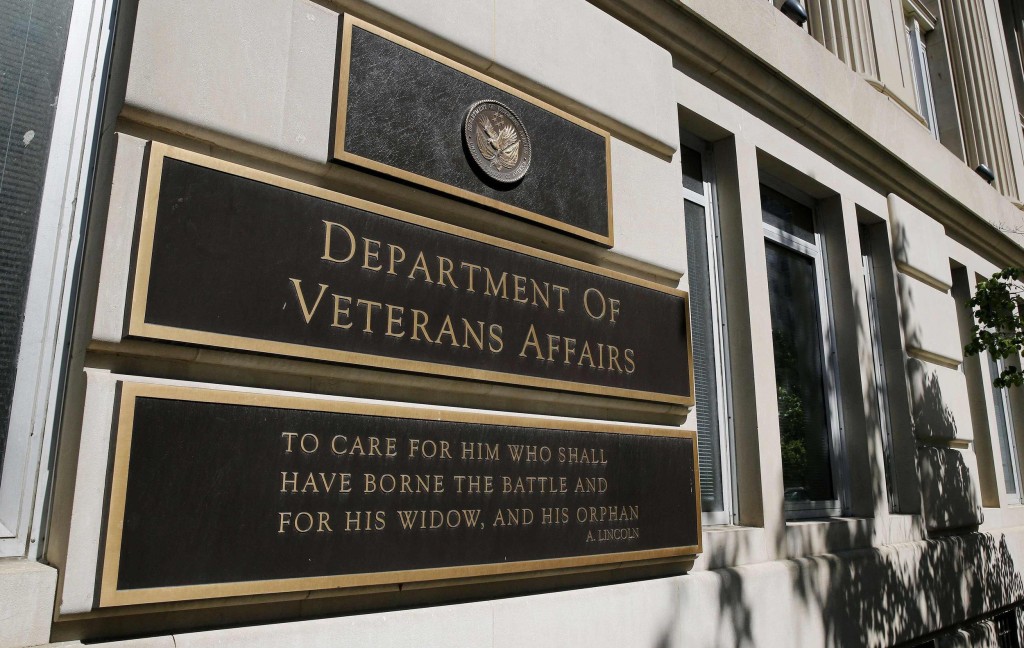
Soon veterans living in Mobile won’t have to travel far to receive care. A new clinic has been approved by the U.S. Department of Veterans Affairs to replace the current, outdated clinic on Springhill Avenue. Thanks in part go to Alabama 1st District U.S. Rep. Bradley Byrne, who’s made getting a new VA clinic one of his top priorities in Congress. Byrne made the announcement of the new clinic in a press release Thursday afternoon. “This announcement is music to the ears of the over 50,000 veterans who live in Southwest Alabama,” said Byrne. “Since being elected to Congress, I have repeatedly called on the VA to move forward with this project. It is a shame the process took as long as it did, but the new facility will be able to better serve those who have given so much to our country.” Byrne continued, “The work is not done. I will continue to provide diligent oversight throughout the construction process to ensure the project remains on schedule. We must also continue pushing for reforms at the VA to ensure accountability and promote greater choices for our veterans.” Last April, Byrne sent a letter to Department of Veterans Affairs (VA) Secretary Robert McDonald, urging the VA to expedite construction of a new VA clinic in Mobile. More information on the new clinic is not yet available.
Bradley Byrne: Keeping up with the U.S. Navy

“A good Navy is not a provocation to war. It is the surest guaranty of peace.” Those were the words of President Theodore Roosevelt in 1902, but they hold true today. One of the keys to peace and stability in the world is a strong naval fleet. I recently had the opportunity to travel with the U.S. Navy to observe the Rim of the Pacific (RIMPAC) naval training exercise in the Pacific Ocean. RIMPAC is the largest naval exercise in the world and involves navies from nations all around the Pacific Ocean. This year saw the largest cohort of nations participating with 25 navies taking part and six others observing. There were approximately45 surface ships, 5 submarines, 200 aircraft, and 45,000 personnel. The U.S. had the largest presence with 23 ships. Russia was not invited to this year’s exercise, but they were there nonetheless. Russia had several ships in the area “observing,” even though they were not invited to participate or observe. The participating navies did preparation on shore and at dock together and then went to sea exercising everything from humanitarian operations to submarine rescue to surface, anti-submarine and naval air warfare. The highlight of RIMPAC for me was getting to visit the USS Coronado, a Mobile-built Littoral Combat Ship (LCS), at sea. RIMPAC served as the “coming out party” of sorts for the Austal USA ship, and it is safe to say that everyone was impressed. From the Chief of Naval Operations to the Commander of the Pacific Fleet to the Commander of the USS Coronado, everyone I talked to raved about the LCS’s performance and capabilities. It really gave me such pride to know the ship was built by the hardworking people of Alabama. While on the Coronado, I actually had the opportunity to drive the ship. As someone who grew up driving boats on Mobile Bay, it was really something to drive such a large vessel. Most impressive, the LCS can get up to around 38 knots, or 42 miles per hour, and it can turn on a dime. In addition to visiting the LCS, our group also paid a visit to the USS John C. Stennis, an aircraft carrier. There is nothing quite like landing and shooting off an aircraft carrier. It is a truly unique experience. While on the ship, I was able to eat lunch with some service members from Alabama. I was excited to meet Deshundra Taite from Monroeville. Seeing people from Southwest Alabama reminded me just how small the world really is. I asked the sailors I met if they had anything I needed to know or anything I could do for them. One of them made a pretty powerful statement. She said to remind the American people how hard it is for our service members to be away from their families and loved ones for so long. It was a powerful reminder about service and sacrifice. We also had the opportunity to visit a submarine, a fuel storage facility, the Pacific Command headquarters, and the USS Arizona Pearl Harbor Memorial. All were very impressive and helped me better understand the U.S. Navy. I returned back to my home on Mobile Bay exhausted but all the more impressed by the quality of technology and individuals who make up the Navy. As a laid down that night, I was able to sleep soundly knowing the U.S. Navy patrols the world’s seas assuring our freedom and safety. • • • Bradley Byrne is a member of U.S. Congress representing Alabama’s 1st Congressional District.


